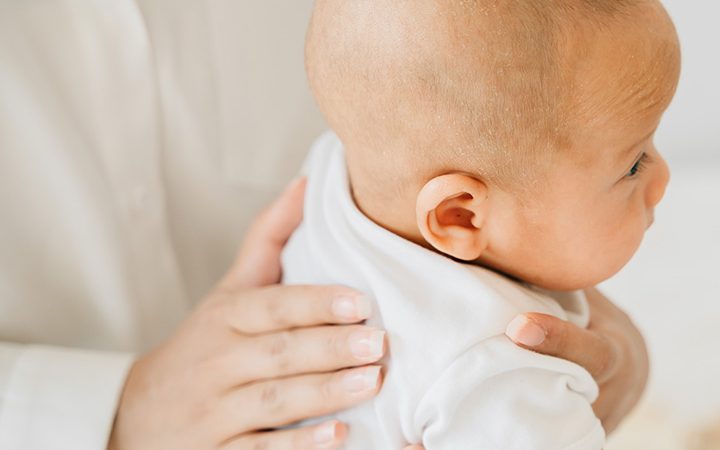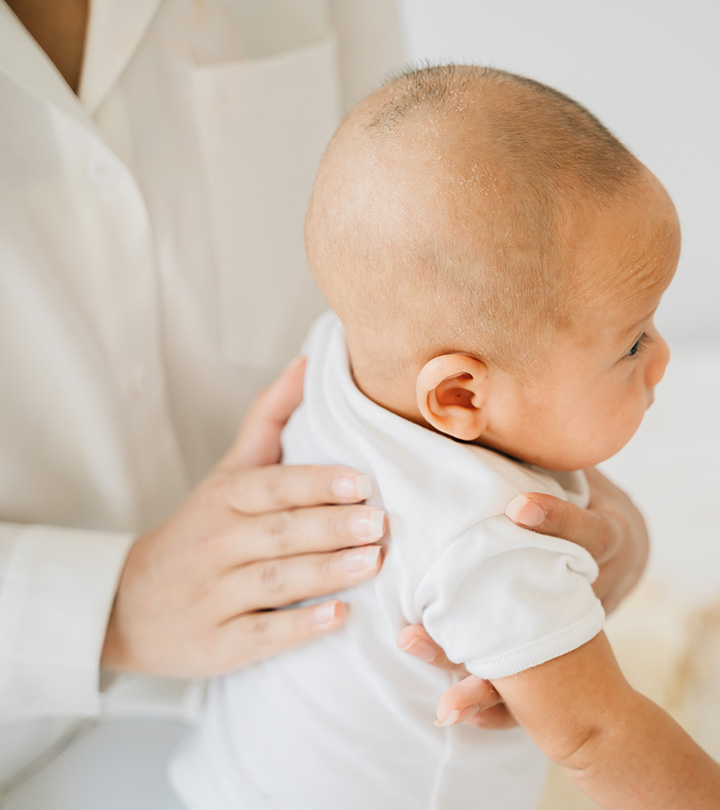Hiccups are the repeated contractions of the diaphragm (1). These contractions cause the vocal cords to shut, creating the characteristic ‘hic’ sound. Newborns get hiccups frequently, and it is usually not a cause for concern until your baby is a year old. However, if the hiccups seem odd or are frequent after the age of one year, talk to the baby’s pediatrician about it.
Read about the causes, prevention, treatment, and prevention of newborn hiccups in this post.
What Causes Hiccups In Babies?
The exact cause of hiccups in infants is not known (2). Hiccups fundamentally occur due to the trigger of the hiccups reflex, which is constituted of the simultaneous action of the diaphragm, muscles that control the trachea, and nerves. If the nerves involved in the reflex are triggered or irritated, it leads to hiccups, which are regulated by parts of the brain and the spinal cord.
Several conditions may trigger or irritate the hiccup reflex nerves. The most common causes among newborns are swallowing excess air while feeding and overfeeding (3). Some newborns may have hiccups even without any noticeable triggers since hiccups tend to be common during the first few months of the baby’s life (4).
How To Stop A Baby’s Hiccups?
Hiccups generally go away themselves, and there is no need to intervene. Nevertheless, you may consider the following interventions to help relieve hiccups in babies (3).
- Change feeding positions: In the case of bottle-fed babies, feeding them in an upright position prevents extra air from entering their stomachs, reducing hiccups.
- Slow down feeding: If you bottle-feed your baby at a fast pace, there are chances that their stomach will expand swiftly and push against the diaphragm, causing hiccups. You may try slow bottle-feeding techniques, such as paced bottle-feeding, to reduce hiccups.
- Hold your baby upright: Hold your baby upright immediately after bottle-feeding or breastfeeding them. It may help the gulped air escape from their stomach.
- Take a break and burp: Burp your baby between feeds to release the trapped gas from the stomach and prevents hiccups.
- Use a pacifier: Giving a pacifier to your hiccupping baby may help relax the diaphragm and reduce hiccups. However, do not force the baby to have the pacifier if they repeatedly decline it.
- Try gripe water: Gripe water is a mixture of several herbs and is often available as an over-the-counter (OTC) medicine. It is mainly recommended for babies with colic or gastrointestinal disorders. You may consider giving gripe water for newborn hiccups. However, it is recommended you consult a doctor before giving any OTC medicines to your little one.
A baby may not be bothered by hiccups and continue eating and sleeping even with them (5). Research suggests that hiccups may benefit infants since the hiccup reflex triggers a large wave of brain signals. These signals may help the baby’s brain learn to monitor and voluntarily control the breathing muscles (6). Therefore, if the baby does not seem bothered with the hiccups, you may leave them alone and wait for the hiccups to stop, which may happen in some minutes.
What Not To Do To Stop The Hiccups?
There are various remedies available online related to reducing hiccups. Some of these remedies or techniques include the following, and you must never try them on the baby (7).
- Startling the baby suddenly to overwhelm the vagus nerve (nerve from the brain to the abdomen)
- Letting a spoonful of sugar dissolve on their tongue
- Tickling the roof of their mouth with a Q-tip or similar object
- Holding their breath
How To Prevent Hiccups In Babies?
You may prevent hiccups in babies by avoiding the potential triggers. Below are a few methods that may help prevent hiccups in newborns and babies.
- Avoid feeding at a fast pace.
- Do not tip the bottle vertical since it could cause the baby to gulp large quantities of milk and air.
- Do not overfeed the baby.
- Burp the baby often during and after a feed.
- Do not lay your baby down right after they have completed feeding.
When To Call A Doctor?
You may see a doctor in the following scenarios.
- Hiccups are persistent and interfere with the baby’s eating and sleeping pattern.
- Hiccups are accompanied by coughing, spitting up a small quantity of milk, crying, and arching the back, especially after feeding. These signs may indicate acid reflux.
- The baby shows frequent hiccups even after the age of one year.
Hiccups in a newborn are common and should not cause concern. Certain preventive measures may help reduce and avoid hiccups in your little one. However, if your newborn gets frequent hiccups after they turn a year old or hiccups seem to bother your baby, contact your baby’s healthcare provider.
References:
MomJunction’s articles are written after analyzing the research works of expert authors and institutions. Our references consist of resources established by authorities in their respective fields. You can learn more about the authenticity of the information we present in our editorial policy.
The following two tabs change content below.




































